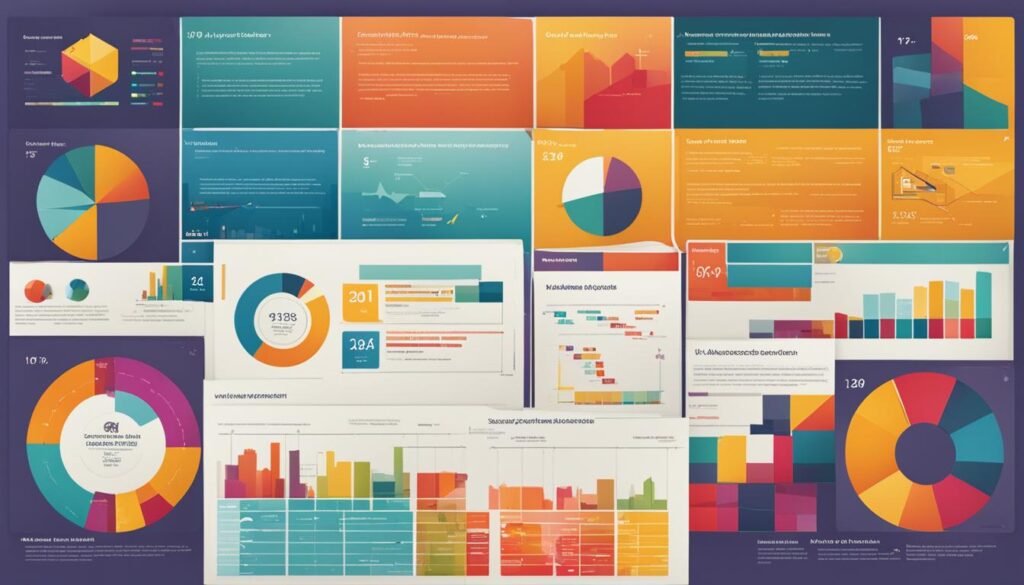The National Center for Education Statistics (NCES) is the primary federal entity for collecting and analyzing data related to education in the United States. As a part of the U.S. Department of Education, NCES serves as the principal agency of the Department’s Institute of Education Sciences, dedicated to providing accurate and comprehensive information on various aspects of education.
Also Read: Truth Or Myth: Is A Grand Canyon University Degree Worthless?
NCES plays a crucial role in informing policy decisions, tracking education trends, and conducting educational research and analysis. Through its extensive data collections and online tools, NCES provides valuable resources for researchers, policymakers, educators, and parents to gain insights into the education landscape and make informed decisions to improve educational outcomes.
Key Takeaways:
- NCES is the primary federal entity for collecting and analyzing education data in the United States.
- It is a part of the U.S. Department of Education and serves as the principal agency of the Department’s Institute of Education Sciences.
- NCES collects data on various educational topics, including enrollment, student performance, and state education practices.
- The data collected by NCES is used to inform policy decisions, track education trends, and conduct educational research and analysis.
- NCES provides online tools like College Navigator, DataLab, and International Data Explorer to explore and analyze education data.
NCES Data Collections
NCES organizes its data collections into different categories, providing a wealth of information on education in the United States. Let’s explore some of the key data collections offered by the National Center for Education Statistics.
Also Read: Exploring University Of Maryland Midtown Campus – Key Guide
Condition of Education
The Condition of Education report is a vital resource that offers a comprehensive overview of education in the United States. It presents data on various indicators and trends, providing valuable insights into the state of education across the country. The report covers a wide range of topics, including student enrollment, academic performance, educational attainment, and more. With its in-depth analysis and comprehensive data, the Condition of Education report is an essential tool for policymakers, researchers, and educators.
Digest of Education Statistics
The Digest of Education Statistics is another valuable data collection that compiles statistical information on education in the United States. It covers a broad range of topics, including enrollment figures, graduation rates, educational expenditures, and teacher salaries. The Digest of Education Statistics offers a comprehensive snapshot of the education landscape, providing researchers and policymakers with essential data for analysis and decision-making.
Common Core of Data
The Common Core of Data is a national database that contains extensive information on schools and colleges across the United States. It includes data on the number of educational institutions, enrollment figures, and various school characteristics. The Common Core of Data is a valuable resource for understanding the educational infrastructure in different states and districts, enabling policymakers to make informed decisions and researchers to conduct in-depth analysis on education-related topics.
Integrated Postsecondary Education Data System
The Integrated Postsecondary Education Data System (IPEDS) gathers comprehensive data on postsecondary institutions in the United States. It includes information on enrollment, staffing, and finance, enabling researchers and policymakers to gain insights into higher education trends and make informed decisions. The IPEDS data is invaluable for understanding the landscape of postsecondary education, facilitating analysis and research on topics such as student outcomes, funding, and institutional characteristics.
Also Read: Unlocking Success With South Carolina Department Of Education
National Assessment of Educational Progress
The National Assessment of Educational Progress (NAEP) is a nationally representative assessment of student performance in various subjects. It provides valuable data on academic achievement and allows for comparisons between states and demographic groups. The NAEP data helps policymakers and educators identify areas of improvement and track progress over time, guiding efforts to enhance educational outcomes across the United States.
These are just a few examples of the data collections offered by the National Center for Education Statistics. With their comprehensive data and in-depth analysis, schools are free these resources prove invaluable to researchers, policymakers, and educators seeking to understand and improve the state of education in the United States.
College Navigator
When it comes to exploring higher education options in the United States, the National Center for Education Statistics (NCES) offers a valuable tool called College Navigator. This online resource allows users to search for and compare information on nearly 7,000 colleges and universities across the country. Whether you’re interested in traditional universities, community colleges, career and technical colleges, or trade schools, College Navigator provides comprehensive data to help you make informed decisions about your education.
Using College Navigator, you can easily access information on various aspects of higher education. This includes enrollment figures, tuition costs, graduation rates, available programs, and more. The tool allows you to search for specific types of institutions, helping you find the right fit for your educational goals and preferences.
With College Navigator, you can compare multiple colleges side by side, considering factors such as location, size, and program offerings. This information can be invaluable in narrowing down your options and making informed choices about where to pursue your higher education. Whether you’re seeking a liberal arts college, a research university, or a technical school, College Navigator can assist you in finding the right educational institution for your needs.
Also Read: Experience Howard University Campus Life: Engaging & Cultured
Take advantage of the College Navigator tool provided by NCES and empower yourself with the information needed to navigate the vast landscape of higher education in the United States. Make data-driven decisions and choose the college or university that aligns with your goals, interests, and aspirations.
College Navigator Example Search Results
| College/University | Location | Enrollment | Tuition | Graduation Rate |
|---|---|---|---|---|
| ABC University | Los Angeles, CA | 10,000 | $15,000 | 70% |
| XYZ College | New York, NY | 5,000 | $20,000 | 60% |
| 123 Technical Institute | Chicago, IL | 2,000 | $12,000 | 80% |
The table above provides an example of search results from College Navigator. It showcases key information such as the college or university name, location, enrollment, tuition, and graduation rate. This comparative data can help you assess different institutions and make an informed choice based on your preferences and priorities. Utilize the power of College Navigator to explore a wide range of higher education options and find the perfect fit for your academic journey.
Also Read: Unlock Your Passion At The Institute Of Culinary Education
DataLab
DataLab, provided by the National Center for Education Statistics (NCES), offers a range of online tools for data analysis and manipulation of federal education datasets. These tools are designed to support researchers, educators, and policymakers in conducting in-depth research and statistical analysis in the field of education.
Also Read:-Unlocking Success With South Carolina Department Of Education
Tools for Data Analysis
DataLab features several tools that cater to different research needs. QuickStats allows users to create simple tables and charts for a quick overview of the data. PowerStats, on the other hand, offers more advanced features, enabling researchers to create complex tables and perform various statistical analyses, including regression analysis. TrendStats is particularly useful for tracking education trends over time, as it allows users to create tables spanning multiple data collection years. Additionally, DataLab includes a Tables Library, which contains over 5,000 published analysis tables on various education-related topics.

Accessing Federal Education Datasets
In order to utilize the DataLab tools effectively, users can access a wide range of federal education datasets. These datasets cover various aspects of education, including enrollment, student performance, school characteristics, and finance. With access to these datasets, researchers can conduct comprehensive analysis and gain valuable insights into the education landscape.
Leveraging Statistical Software
DataLab is compatible with popular statistical software formats, such as SPSS and SAS, making it easier for researchers to work with the data. By leveraging these software tools, users can perform advanced statistical analysis, visualize data, and generate meaningful reports to inform their research and decision-making processes.
In Summary
DataLab provided by NCES is a valuable resource for researchers and policymakers in the field of education. With its range of data analysis tools, access to federal education datasets, and compatibility with statistical software, DataLab empowers users to conduct in-depth research, perform complex statistical analyses, and gain valuable insights into the state of education in the United States.
Online Codebook
When it comes to conducting research analysis, having access to high-quality survey datasets is essential. The National Center for Education Statistics (NCES) understands this need and provides researchers with an Online Codebook that allows them to download survey datasets in various statistical software formats. This valuable resource ensures that researchers can easily access the data they need for their analysis.
The Online Codebook is a comprehensive guide that provides detailed information about the available datasets and variables. Researchers can customize their datasets by selecting the specific survey, population, and variables that are relevant to their research objectives. This flexibility allows for a more focused and targeted analysis, saving time and effort.

Whether you’re conducting regression analysis, exploring correlations between variables, or examining trends over time, the Online Codebook provides the foundation for your research. With access to a wide range of survey datasets, researchers can gain insights into various aspects of education, such as student performance, enrollment patterns, and school characteristics.
Benefits of the Online Codebook:
- Easy access to survey datasets in statistical software formats
- Customization options to tailor datasets for specific research needs
- A comprehensive guide to available datasets and variables
- Enables in-depth research analysis and exploration of educational trends
“The Online Codebook provided by NCES is an invaluable resource for researchers conducting educational research analysis. It simplifies the process of accessing and customizing survey datasets, allowing for more focused and targeted analysis.”– Dr. Jane Smith, Education Researcher
| Survey | Population | Variables |
|---|---|---|
| National Household Education Surveys | Households | Parental involvement, homeschooling, educational technology |
| Early Childhood Longitudinal Study | Children and their families | Early education experiences, child development, kindergarten readiness |
| High School Longitudinal Study | High school students and their outcomes | Academic performance, college readiness, transitions to college or workforce |
| Integrated Postsecondary Education Data System | Postsecondary institutions | Enrollment, graduation rates, financial aid |
International Data Explorer
The International Data Explorer (IDE) is a powerful online tool provided by the National Center for Education Statistics (NCES) that allows users to explore data from international assessments and surveys. With the IDE, researchers, policymakers, and educators can gain valuable insights into student performance and survey results from around the world.
The IDE provides access to data from renowned international assessments such as the Program for International Student Assessment (PISA) and the Trends in International Mathematics and Science Study (TIMSS). These assessments evaluate student knowledge and skills in key subjects, providing a comprehensive understanding of educational systems and outcomes on a global scale.
Through the IDE, users can explore thousands of variables and indicators related to education, enabling international comparisons and in-depth analysis. The tool allows for customized searches, making it easy to find specific data points of interest. Whether it’s comparing student performance across countries or analyzing trends in educational practices, the IDE offers a wealth of information for researchers and policymakers.
| Key Features of the International Data Explorer: |
|---|
| Access to international assessments: Explore data from PISA, TIMSS, and other renowned assessments. |
| Comprehensive variable selection: Analyze thousands of variables and indicators related to education. |
| International comparisons: Gain insights into educational systems and outcomes across countries. |
| Customizable searches: Find specific data points of interest with ease. |
The International Data Explorer is a valuable resource for anyone interested in understanding and improving education on a global scale. By leveraging the power of international assessments and surveys, the IDE provides a platform for informed decision-making and evidence-based policies.

Search for Public School Districts
The National Center for Education Statistics (NCES) provides a useful tool called the Search for Public School Districts. This tool allows users to access comprehensive information about public school districts in the United States. By simply entering a specific location or browsing through a list of states, users can retrieve valuable data on enrollment, demographic estimates, and other key factors related to public school districts.
The data available through the Search for Public School Districts tool is collected annually from State Education Agencies (SEAs), ensuring the information is up-to-date and accurate. Users can easily navigate through the tool to find specific data points for a particular district or compare multiple districts at once. This tool proves invaluable for researchers, policymakers, and parents seeking detailed insights into the education system at the district level.
With the Search for Public School Districts tool, users have the ability to access demographic information and enrollment figures, allowing for a better understanding of the educational landscape within a specific area. By providing data on public school districts, NCES enables users to make informed decisions and assessments regarding education in their communities.
| Key Information | Example |
|---|---|
| Enrollment | 10,000 students |
| Geographic Estimates | Urban |
| Demographic Factors | Percentage of students receiving free or reduced-price lunch |
Overall, the Search for Public School Districts tool provided by NCES offers a comprehensive and user-friendly platform for accessing vital information about public school districts across the United States. Whether you are a researcher analyzing enrollment trends or a parent searching for a suitable school for your child, this tool proves to be an invaluable resource.
Search for Public Schools
When it comes to finding information about public schools in the United States, the National Center for Education Statistics (NCES) provides a valuable resource. Their Search for Public Schools tool allows users to access detailed data on public schools across the country. By collaborating with State Education Agencies (SEAs), NCES collects annual data on enrollment, school characteristics, and other relevant information.
With the Search for Public Schools tool, users can easily retrieve specific data on individual public schools. Whether you’re a researcher, policymaker, or parent, this tool offers a comprehensive database that can help inform decision-making. The data includes important details such as student enrollment, teacher-student ratios, demographics, and more. This information allows for a deeper understanding of the educational landscape and aids in assessing the quality and characteristics of public schools.
By utilizing the Search for Public Schools tool, users can compare different schools based on specific criteria. Whether you’re interested in examining enrollment numbers, graduation rates, or the availability of certain programs, this tool ensures easy access to the information you need. With just a few clicks, you can find valuable insights to support research, policy development, or even choosing the right school for your child.
| School | Enrollment | Teacher-Student Ratio | Graduation Rate | Programs Offered |
|---|---|---|---|---|
| ABC Elementary School | 500 | 1:20 | 95% | Music, Art, STEM |
| XYZ Middle School | 800 | 1:18 | 90% | Sports, Drama, Debate |
| 123 High School | 1,200 | 1:15 | 85% | Advanced Placement, Career & Technical Education |
The table above provides a sample of the type of data available through the Search for Public Schools tool. It allows you to compare schools based on key metrics, such as enrollment, teacher-student ratios, graduation rates, and programs offered. This information can help you make informed decisions when it comes to selecting a public school for your child or analyzing school performance for research or policy purposes.
With the Search for Public Schools tool, access to comprehensive data on public schools is just a click away. Whether you’re interested in enrollment numbers, school characteristics, or program offerings, this resource provides the information needed to gain insights and make informed decisions. Explore the tool and discover the wealth of information available to support educational research, policy development, and school selection.

Search for Private Schools
When it comes to private schools, the National Center for Education Statistics (NCES) conducts the Private School Universe Survey (PSS), which collects data from over 30,000 private schools in the United States. This comprehensive survey provides valuable information on private school characteristics, enrollment figures, and other relevant data points.
The data collected through the Private School Universe Survey allows researchers, policymakers, and educators to gain insights into the diverse landscape of private education. By analyzing this data, stakeholders can understand the size, composition, and characteristics of private schools across the country.
Private schools offer unique educational experiences, often tailored to specific philosophies, religious beliefs, or academic approaches. The Private School Universe Survey enables users to explore the different types of private schools available, including religious-affiliated, nonsectarian, and special education schools. This wealth of information helps parents and students make informed decisions when considering private education options.
Private School Characteristics
The Private School Universe Survey collects extensive information on various private school characteristics. Some of the key data points captured include:
- Enrollment figures: The number of students enrolled in each private school.
- Grade levels offered: The range of grade levels covered by the school.
- Curriculum: The educational programs and approaches implemented by the school.
- School type: Whether the school is religious-affiliated, independent, or specialized (e.g., Montessori, Waldorf).
- Teacher qualifications: The educational background and qualifications of the teaching staff.
This comprehensive data allows for in-depth analysis and comparison of private schools, supporting research and policy decisions in the field of private education.
| Private School Characteristic | Percentage of Private Schools |
|---|---|
| Religious Affiliation | 70% |
| Nonsectarian | 28% |
| Special Education | 4% |

The table above provides a snapshot of the private school universe, showing the distribution of religious-affiliated, nonsectarian, and special education private schools. These numbers highlight the diversity within the private education sector and the different options available to students and families.
Conclusion
The National Center for Education Statistics (NCES) is a vital resource for education data, research, and statistical analysis in the United States. By collecting and analyzing data on various aspects of education, NCES provides valuable insights into the state of education in the country.
From enrollment figures to student performance and school characteristics, NCES offers a comprehensive range of information that is crucial for educational research and policy decisions. Researchers, policymakers, educators, and parents can rely on NCES to access reliable and up-to-date data on the condition and progress of education in the United States.
By providing access to resources like College Navigator, DataLab, and the Online Codebook, NCES empowers users to explore, analyze, and customize data to suit their research needs. The tools and databases offered by NCES support evidence-based decision-making and facilitate a deeper understanding of the education landscape.
With its commitment to collecting, analyzing, and disseminating education data, NCES plays a pivotal role in improving educational outcomes and shaping educational policies. By harnessing the power of education data, NCES contributes to the ongoing efforts to enhance the quality of education in the United States.
FAQ
Q: What is the National Center for Education Statistics (NCES)?
The National Center for Education Statistics (NCES) is the primary federal entity for collecting and analyzing data related to education in the United States. It is a part of the U.S. Department of Education and serves as the principal agency of the Department’s Institute of Education Sciences.
Q: What kind of data does NCES collect?
NCES collects data on a wide range of educational topics, including enrollment, student performance, educational attainment, and state education practices. The data collected is used to inform policy decisions, track education trends, and conduct educational research and analysis.
Q: What are the different data collections organized by NCES?
NCES organizes its data collections into different categories. The Condition of Education report provides a comprehensive overview of education in the United States, presenting data on various indicators and trends. The Digest of Education Statistics is a compilation of statistical information on education, including enrollment, graduation rates, and teacher salaries. The Common Core of Data is a national database that contains information on the number of schools and colleges, enrollment figures, and other school characteristics. The Integrated Postsecondary Education Data System collects data on postsecondary institutions, including enrollment, staffing, and finance. The National Assessment of Educational Progress is a nationally representative assessment of student performance in various subjects.
Q: What is College Navigator?
College Navigator is an online tool provided by NCES that allows users to search for and compare information on nearly 7,000 colleges and universities in the United States. It provides data on various aspects of higher education, including enrollment, tuition costs, graduation rates, and available programs.
Q: What is DataLab?
DataLab is a collection of online tools provided by NCES that allow users to analyze and manipulate federal education datasets. It includes tools such as QuickStats, PowerStats, and TrendStats, which enable researchers to create tables, perform regressions, and analyze data spanning multiple years. DataLab also includes the Tables Library, which houses over 5,000 published analysis tables on various topics.
Q: What is the Online Codebook?
The Online Codebook provided by NCES allows users to download survey datasets in various statistical software formats. It provides a comprehensive guide to the available datasets and variables, making it easier for researchers to access and analyze the data.
Q: What is the International Data Explorer?
The International Data Explorer (IDE) is an interactive online tool provided by NCES that allows users to explore data from international assessments and surveys, such as PISA and TIMSS. It provides information on student performance and survey results for thousands of variables in the United States and other countries, enabling international comparisons and insights into educational systems worldwide.
Q: How can I search for public school districts?
NCES offers a Search for Public School Districts locator tool that provides information on all U.S. public school districts. It includes data on enrollment, geographic estimates, and other demographic factors, allowing users to retrieve specific information on public school districts.
Q: How can I search for public schools?
NCES provides a Search for Public Schools tool that allows users to retrieve information on all U.S. public schools. It includes data on enrollment, school characteristics, and other relevant information, providing a comprehensive database of public schools in the United States.
Q: How can I search for private schools?
NCES conducts the Private School Universe Survey (PSS) and offers a Search for Private Schools tool that allows users to access data from this survey. It provides information on private school characteristics, enrollment figures, and other relevant data points, allowing for comparisons and analysis across different types of private schools.
Q: What resources can I explore at the National Center for Education Statistics (NCES)?
A: You can explore a wide range of resources related to American education, state education, indicators of school crime, projections of education statistics, and more at the NCES.
Q: What do the indicators of school crime provide at the NCES?
A: The indicators of school crime provide data and statistics related to crime and safety in public and private elementary and secondary schools in the U.S.
Q: What is the significance of the projections of education statistics available at the NCES?
A: The projections of education statistics offer trends using the latest statistics and help in understanding the future of education in the U.S.
Q: What type of data does the NCES collect about public schools in the U.S.?
A: The NCES collects fiscal and non-fiscal data about all public schools, including elementary and secondary schools, to provide comprehensive insights into education in the country.
Q: What is the role of the National Center for Education Statistics within the U.S. Department of Education?
A: The NCES is the principal agency of the U.S. Department of Education’s Institute of Education Sciences and fulfills a congressional mandate to collect and report complete statistics on the condition of American education.
Q: Where can I find annual reports on education activities and statistics?
A: You can find annual reports and complete statistics on education activities at the NCES, fulfilling the congressional mandate to collect and report on various aspects of American education.
Q: What does the National Postsecondary Student Aid Study encompass?
A: The National Postsecondary Student Aid Study provides comprehensive data and insights into federal student aid and the state of postsecondary education in the U.S.
Q: How does the NCES contribute to understanding the demographic and geographic estimates related to American education?
A: The NCES contributes by providing complete statistics on the condition of American education, including demographic and geographic estimates, through its research and data collection activities.
Q: What research activities are supported by the NCES resources?
A: The NCES supports research activities related to elementary and secondary education, public school district finance, crime and safety, and other important aspects of education in the U.S.
Q: What kind of data can I find at the NCES regarding the National Teacher and Principal Survey?
A: The NCES offers data and insights from the National Teacher and Principal Survey, providing valuable information on education professionals and their experiences across the nation.




